Yitzhak Navon
Vision and Values
”
May we build a society rooted in compassion, a society that has the power end poverty, violence, political radicalism, and social polarization. A moral, ethical society that will bring us pride, inspire worldwide admiration, and encourage the Jewish Diaspora to immigrate to Israel. And, above all else, a society that wholeheartedly strives for peace.
Yitzhak Navon | July 22, 2011
“
Social Solidarity
“Our capacity for dialogue across different segments of society is what fuels our strength and resilience and grants us the right to call ourselves a people.” (From Yitzhak Navon’s essay “That Which Separates Us and That Which Unites Us,” Israel 2000)
For many, Yitzhak Navon embodied the values of national unity and solidarity. His commitment to bringing people together was a leitmotif of his career. His actions were guided by a solitary goal: to unite Israel’s disparate populations and tear down the walls between individuals and ethnicities.

President Yitzhak Navon welcomes visitors to the President's House during an open-house event in 1979
Photography: Hanania Herman, Government Press Office
Education
“Our land is ample, bountiful, and kind; yet we are not blessed with a wealth of natural resources. We have but one precious resource – our people. We must care for our people from infancy to old age, dedicate our hearts and minds to them, and enable them to fulfill and even exceed their potential.” (Yitzhak Navon during his inauguration as Minister of Culture and Education, September 16, 1984)
Based on his fervent belief that promoting Hebrew language skills was the only way to guarantee and sustain a unified people, Navon led a nationwide Hebrew literacy campaign for adults. As part of the campaign, run by the Ministry of Education’s Culture Department, soldier-teachers were dispatched to Israel’s remote development towns, where they helped strengthen disadvantaged communities and fostered meaningful personal relationships with local residents.
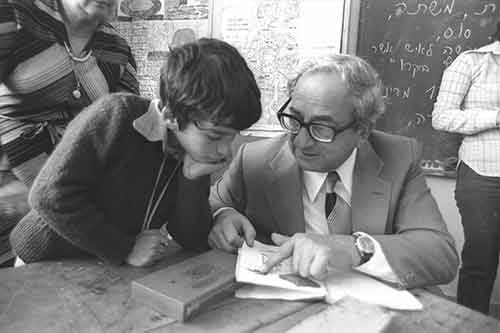
The president visits Tel Aviv's Hatikva neighborhood
Photography: Ya'akov Sa'ar, Government Press Office, March 4, 1979
Bridging Social Inequalities
“I would like to extend to you a blessing: just as you have prevailed in matters of historic importance, may you now be successful in the trivial, the mundane: housing for young couples, the plight of large families, immigration and integration, and our image as a society. These matters may seem banal, but they are exactly what give us the power and resilience to fight and win the big battles.” (From President Navon’s speech at the Knesset, during the reception for Prime Minister Menachem Begin upon his return from the United States, after signing the peace agreement with Egypt, March 29, 1979.)
The state of Israeli society always informed his priorities: the cost of living, support for large families, investment in education, and, above all, bridging the gaps between the country’s different segments and populations.
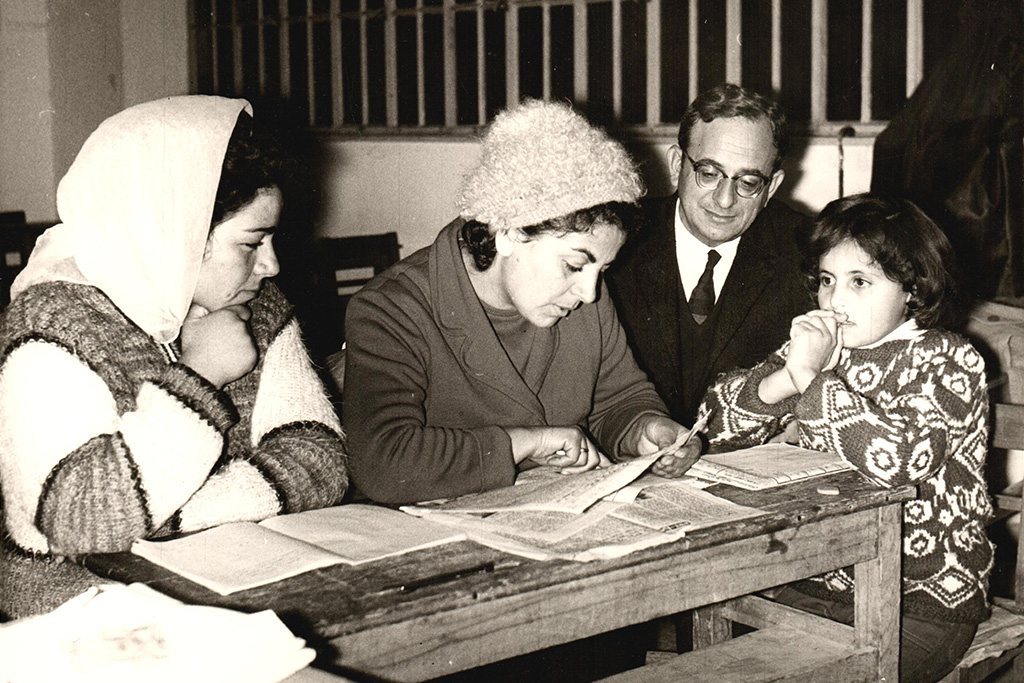
Photography: Yehuda Eisenstark, Government Press Office, 1964
Multiculturalism
“We ought to cultivate and celebrate our ethnic heritage and traditions. Our tribes must join hands and contribute, and, in time, our people will find the common path” (from Yitzhak Navon’s 1975 essay “Our Way of Living”).
Navon believed that we must honor our roots and our past and be proud of the values that have been passed to us by previous generations. In keeping with his beliefs, he used his vast knowledge of foreign languages to pepper his speeches with idioms and expressions in the native language of his listeners. He conversed with Eastern-European Jews in fluent Yiddish, delighted Moroccan immigrants with familiar phrases, and spoke to Israeli Arabs in perfect dialect. Navon worked to embrace and preserve the customs and traditions that the people of Israel brought with them from their native lands.
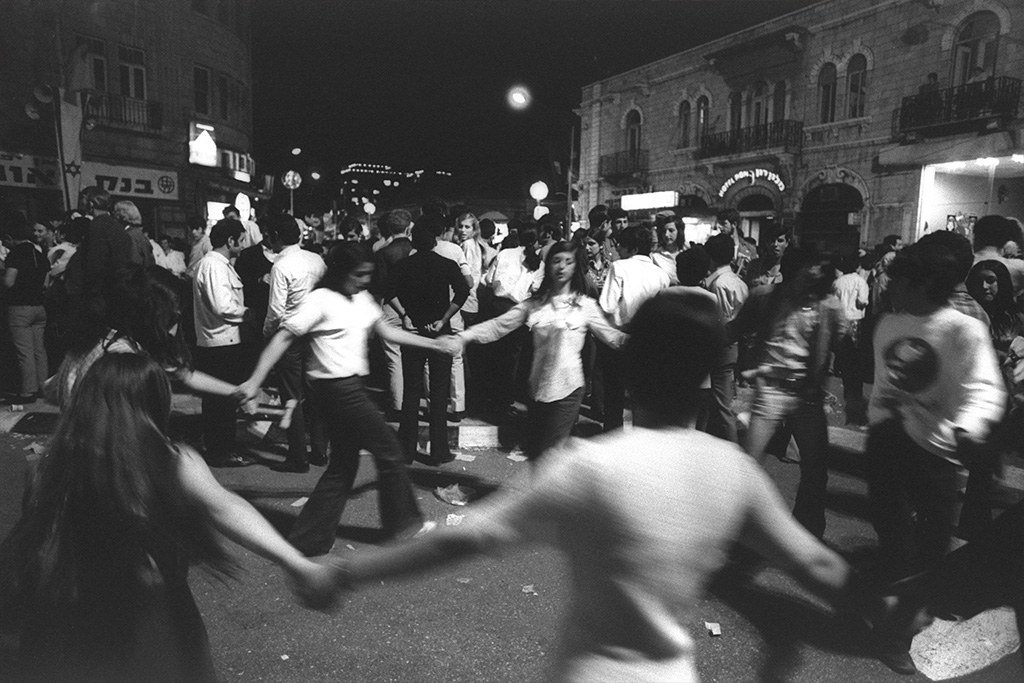
People of different backgrounds dancing together
Photography: Moshe Milner, Government Press Office
Coexistence
“I believe it is absolutely vital that we get to know one another better, because people tend to hate what they do not know. If we don’t make an effort to get to know one another, we reject the only ground upon which trust can be built. And without trust, we can never achieve peace” (from President Yitzhak Navon’s speech at a dinner hosted by Egyptian President Anwar Sadat, Cairo, October 26, 1980).
Navon aspired to achieve coexistence among all segments of Israeli society. As president, he would make a point of congratulating Israel’s Arab populations on Islamic holidays, in perfect Arabic. During his time as Minister of Culture and Education, he introduced new curricula on Islam and the Arabic language. In keeping with his belief that language plays an important role in education to tolerance and acceptance, he made Arabic studies a mandatory subject in Jewish schools and instituted a program for gatherings of schoolchildren from different social segments.
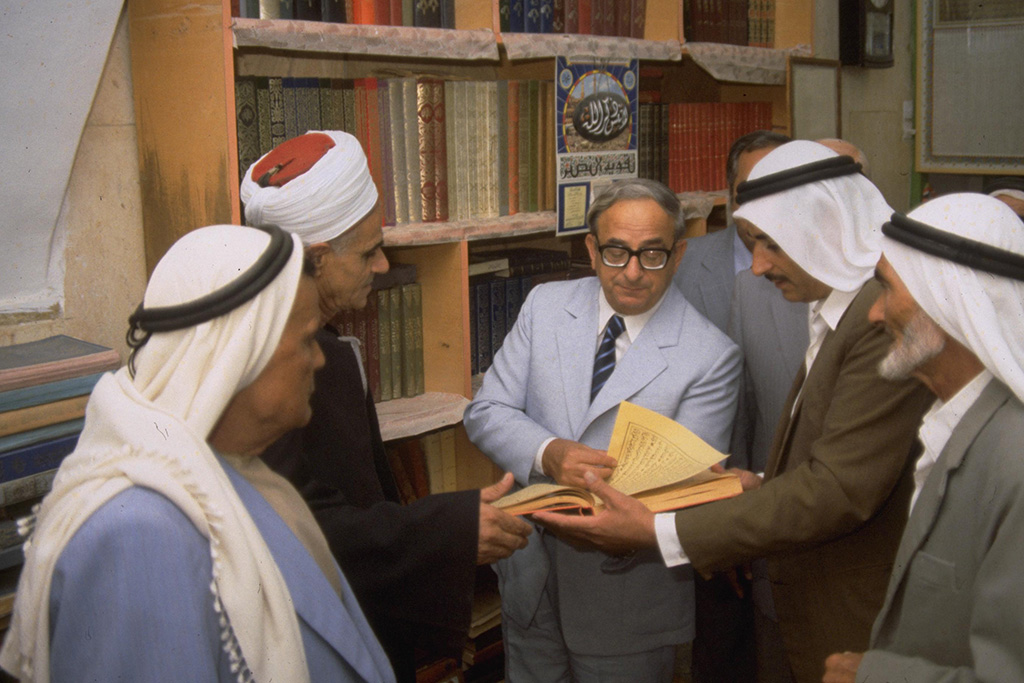
President Navon viewing sacred Islamic writings during his visit to Tayibe, 1980
Photography: Ya'akov Sa'ar, Government Press Office
Peace
“We are living in momentous times. History marches on, and change is always around the corner. I hope that our relationships with our neighbors will soon change as well, and that we may march forward on the road to peace” (Yitzhak Navon, October 7, 2001).
Navon aspired to promote peace and tolerance not only within Israel, but also between Israel and its neighbors. He always believed that brave and thoughtful leadership on both sides coud pave the way to peace, even between sworn enemies. Navon wished for true peace and believed that, if a peace agreement were achieved, it will have a positive effect on all aspects of life in Israel, from the economy and welfare, to education, immigration, and international relations.
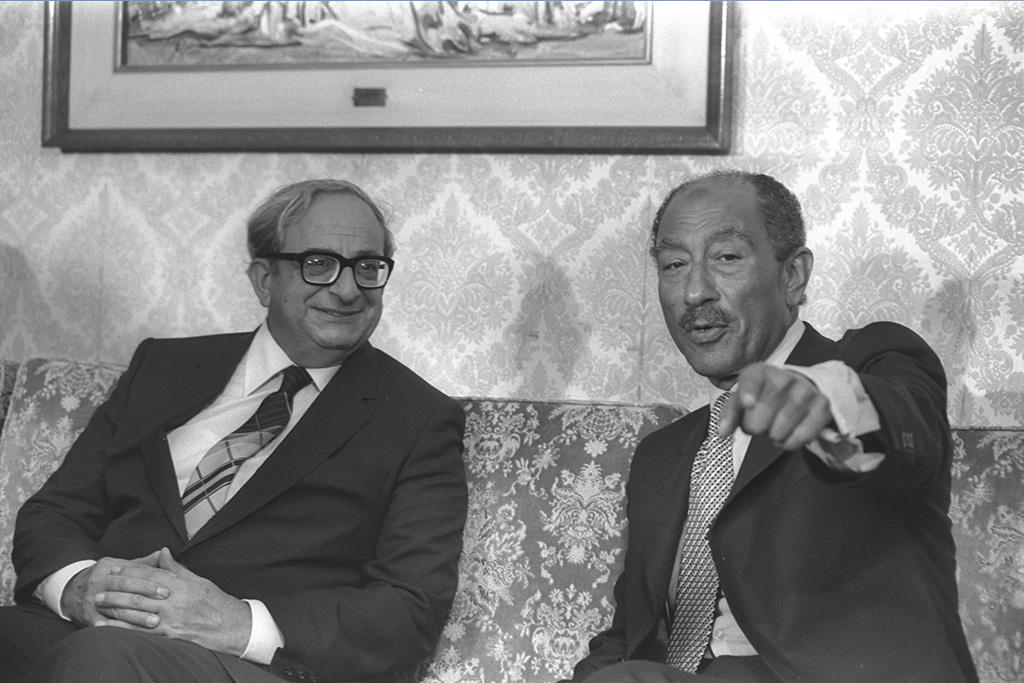
President Navon visits Egypt, 1980
Photography: Ya'akov Sa'ar, Government Press Office
A Model Society and a Light unto the Nations
“Our elders watch us from up above […] We must do our best to be deserving of their legacy, to harness all our power and build an exemplary nation in honor of our ancestors and for the sake of future generations” (rom Navon’s swearing-in ceremony at the President’s House, May 29, 1978).
For Yitzhak Navon, the phrase “a light unto the nations” was more than just a poetic expression. He often asserted his view that we must protect our relations with the rest of the world and conserve our place in history as a pioneering people. To him, the idea of a chosen people living in a model society was not a wistful desire or vague prophecy, but a practical, logical necessity. He yearned to witness the rise of a new Israeli society whose values would encourage immigration from all over the world. Navon adamantly believed that leaders should define a clear vision for society, challenge their people, and inspire hope among them.
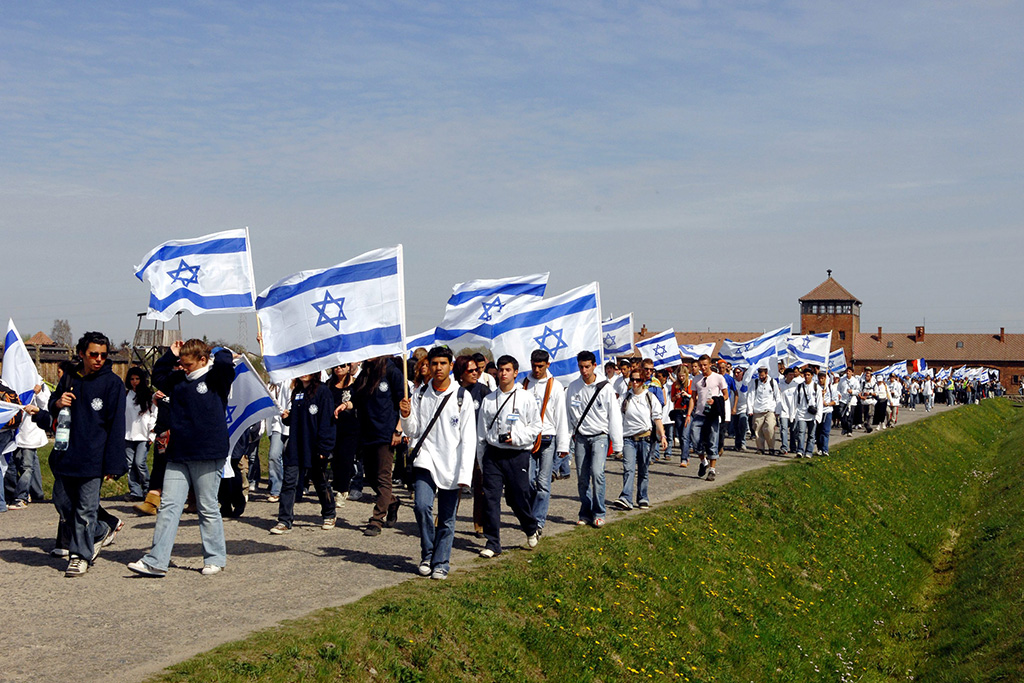
Israeli teenagers participating in the March of the Living in Poland
Photography: Moshe Milner, Government Press Office
Connection with the Jewish Diaspora
Navon often emphasized the need for sympathy and comradery between Jews in Israel and in the Diaspora. In 1972, during the 28th Zionist Congress, Navon was elected Chairman of the Zionist General Council. As Chairman, he would reach out to Jewish communities across the globe to encourage them to immigrate to Israel, reiterate the importance of Jewish education, and speak to them of the dangers of assimilation.
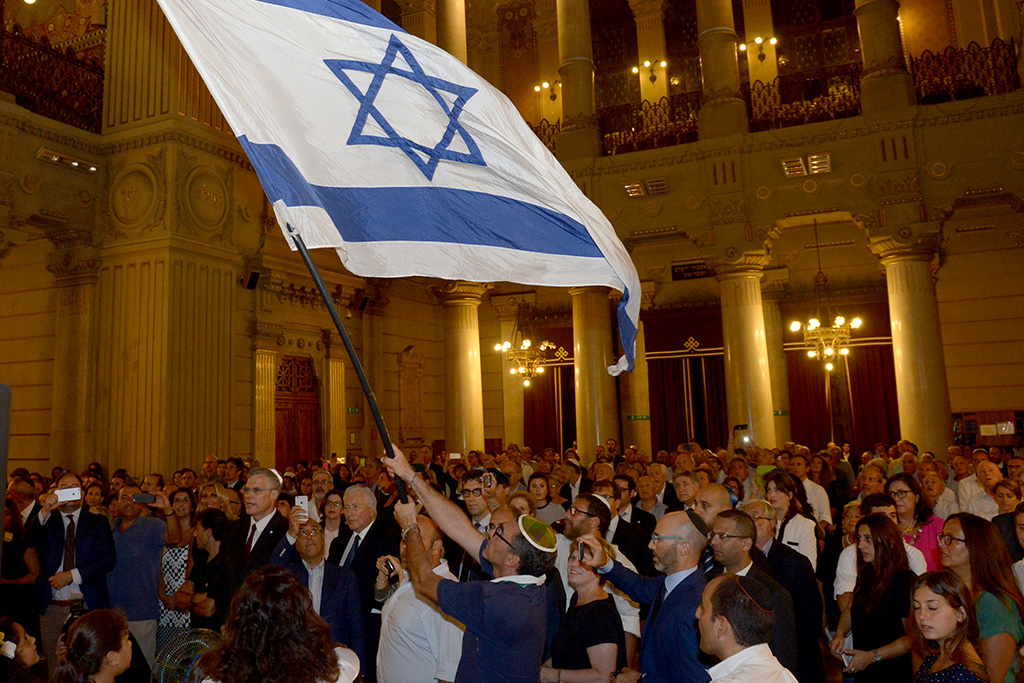
Photography: Haim Zach, Government Press Office
Sephardi Jews
“My soul is bound to the culture of Sephardi Jews. Their poetry, literature, and spirit are with me always […] It is an honor to take part in the commemoration of the culture’s people, thinkers, and poets.”
Sephardic Jewish culture was an inseparable part of Navon’s life. Raised in the Ladino-speaking community of Jerusalem’s Sephardic Jews, Navon was immersed in the values of the Sephardic tradition: the melding of faith and science, compromise, moderation; and the undying love for the Bible, the Hebrew language, and the Land of Israel. These values are all present in his essay on Sephardic Jews, his plays ”Romancero Sefardi” and ”Bustan Sefardi”, and the television series ”Jerusalem in Spain”. Released in 1992, the series follows Navon as he travels to Spain and Portugal in search of his personal and communal roots.
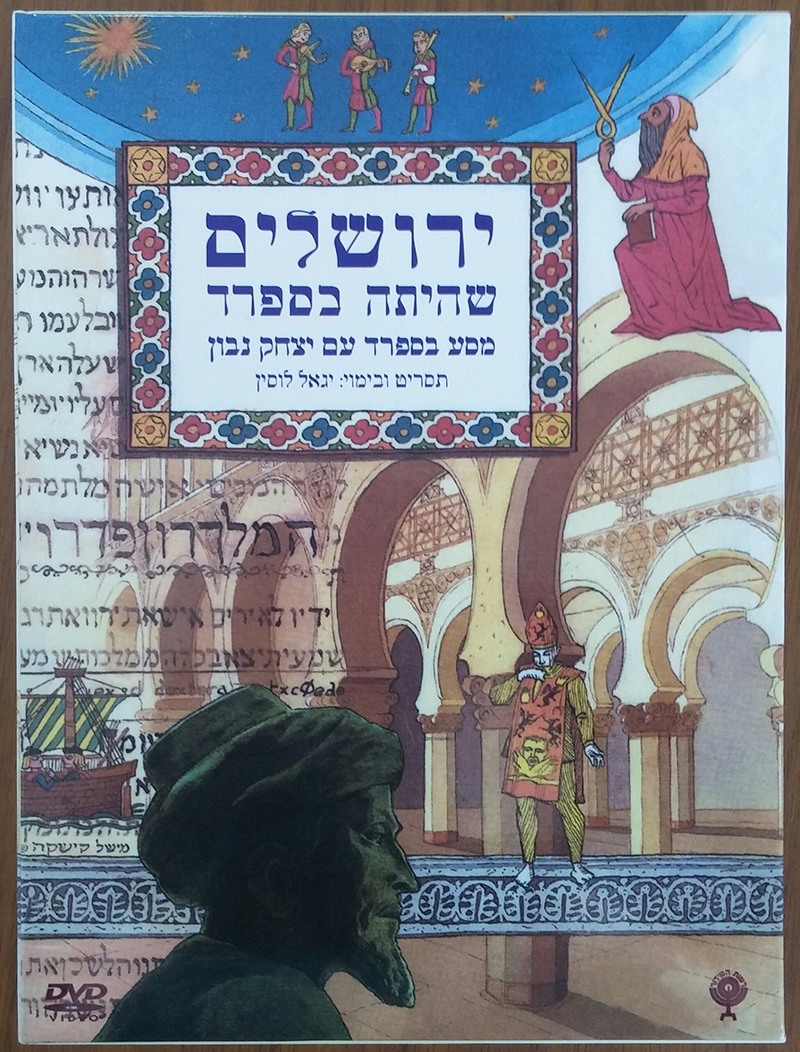
A poster for Jerusalem in Spain (Yerushalayim Shehayta Bisefard), an eight-part documentary series
Photography: Navon Archives
Art and Culture
“How can we instill culture among our schoolchildren? As part of my role […] I founded the National School Cultural Program. We decided that every year, each and every child would be introduced to a total of seven artistic works of cultural significance – theater, dance, film, music, painting, sculpture, and more. It was our hope that, […] over time, this would provide students with a wide enough context to support their cultural knowledge and awareness” (“All the Way: The Autobiography of Yitzhak Navon”, p. 389).
His strong affinity for the arts and culture was evident throughout his career. In his effort to bridge social inequalities, he strived to make the arts and culture accessible to all Israeli citizens, regardless of socioeconomic and geographical circumstances. To further this goal, Navon founded the National School Culture Program, which sought to broaden schoolchildren’s horizons by introducing them to a variety of cultural works and events. As an elected official, Navon often stressed the role of educational institutions in providing access to the arts and culture and shaping the face of society, asserting that “The future of our country lies in the quality of its people, and the quality of its people stems from their dedication to the arts, science, and ethics.” His strong views in favor of the arts paved the way for his long-standing tenure as Chairman of the Jerusalem Academy of Music and Dance Board of Directors, for which he was later granted an Honorary Trustee Award, and led him to become co-founder of the Sam Spiegel Film and Television School in Jerusalem.
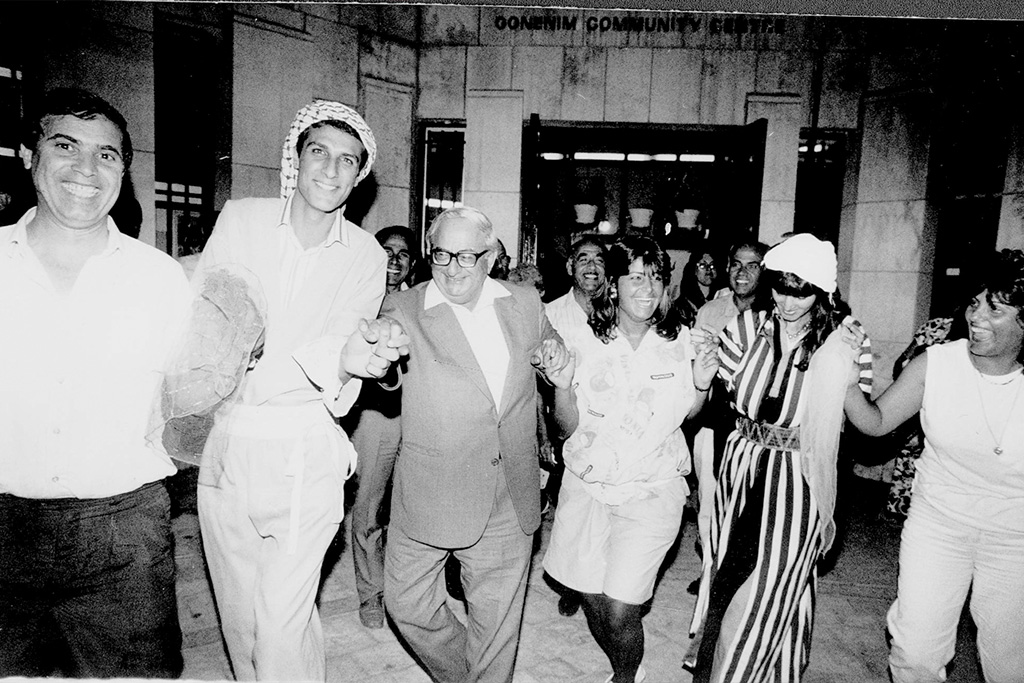
Cultural event at the Gonenim Community Center
Photography: Ronnie Na'aman, 1988
Creative Career
Yitzhak Navon’s creative works reflect his worldview and his ceaseless endeavor to bind hearts and build bridges among Israel’s disparate ethnicities. The yearning for cultural unity and the challenges it posed were a common thread in his writings. His works include ”Six Days and Seven Gates”, ”The Scroll of the Elders in the Western Wall”, and ”Romancero Sefardi”, as well as the play ”Bustan Sfardi”.
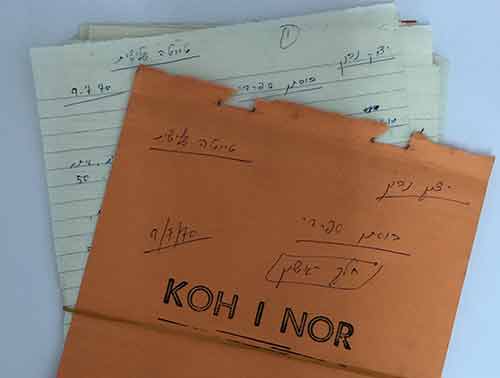
The Love of Hebrew and Jewish Thought
“We should teach ourselves and our students to think candidly and with precision, to debate and argue from a place of openness and acceptance, and to express our full breadth of thought using rich vocabulary, both verbally and in writing” (from Minister of Culture and Education Yitzhak Navon’s speech at the Knesset, March 26, 1986).
Navon considered the revival of the Hebrew language to be one of the greatest miracles that ever happened to the Jewish people. Throughout his career, and particularly in his role as Minister of Culture and Education, Navon was known for his eloquence and expressive language and he sought to impart these qualities to others. During Navon’s speech before the Knesset as it celebrated the 100th anniversary of the modern Hebrew language, he said: “The incredible richness of our language is crippled by four ailments: the weakness of the culture of speech, the poverty of our spoken language, our over-use of foreign loanwords, and our bastardized pronunciation.” Navon lamented the rejection of traditional Hebrew and the disrespect of traditional sources. He therefore instituted a mandatory reading and memorization list covering Bible chapter, liturgical poetry, secular poetry, and ancient and modern literature from different historical periods.
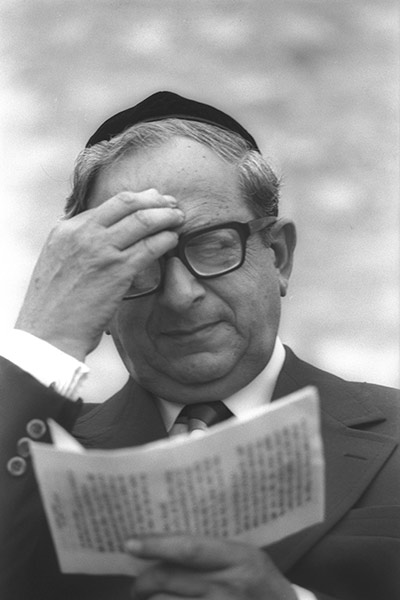
Photography: Nissim Kobo, Government Press Office, June 4, 1978

